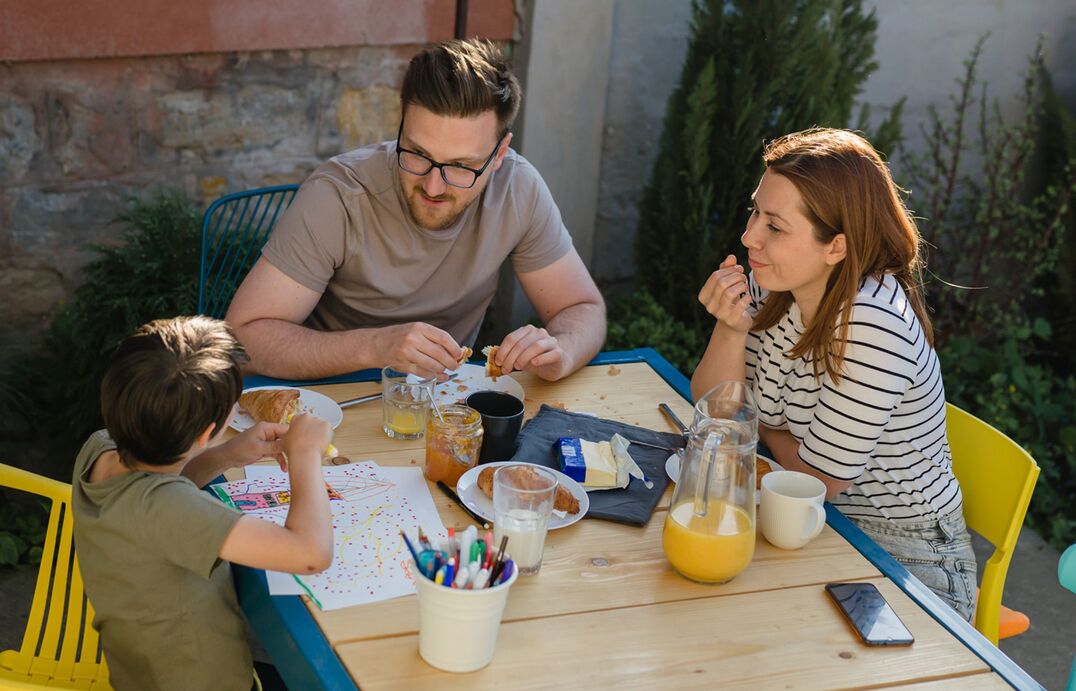Finding balance: becoming a screen smart family
Screens and devices are now firmly part of our world. We all use them to work, play, learn and socialise – and so do our children.

Having conversations with your child is a good way to build a family culture of openness and sharing. The ‘DigiTalk’ is one of the many key conversations you should start having early on.
Open and honest chats about technology and online safety will help to avoid unhealthy habits forming early on. These talks can also help build your child’s understanding and go a long way towards ensuring respect, kindness and positivity towards technology.
Children live in the world that we live in and that is a world full of technology, so it’s never too early to start talking about the online world and technology use. However, there are ways to make sure this is appropriate for each age group.
We have included some prompts below to help you get started, as well as some downloadable conversation cards which you can explore, cut out and use at home to get the conversation moving along.
Young children use devices for entertainment, watching videos or calling family members. They may even know how to unlock your device and access the apps on their own!
This is a good time to start talking about things like security and privacy: you could try things like “I’ve put this passcode on so that people I don’t know can’t use my things. Why do you think that’s a good idea?”
You could follow this with “Have you ever thought about what could happen if someone else did use my phone/tablet?”. This can start a conversation about personal information and what is and isn’t ok to share with other people.
Children may have discovered that the online environment is a great place to learn more about their current interests or hobbies. This might be in the form of videos, games or articles to read.
This is a good time to begin conversations around keeping an eye out for things that could be untrue, or people who are pretending to be someone else.
You could start with something like “I got a request from someone who says they’re an old friend, but I’m not sure. Do you think there’s a good way to find out if they’re real?”
It’s also a chance to draw awareness to selecting reliable and appropriate content. You could ask them to watch some videos together and ask how they choose what they watch.
Follow up with questions like “What other things do you like to watch or play online? What would you do if something came up that you think you shouldn’t be seeing?”
Emphasise that you will always be there to help them handle things, just as you are in the offline world - they just need to ask.
At this age, children might be starting to focus more on their social circles and identity, and could be accessing online games that allow chat between players, or video calling each other.
It’s a good time to ensure they understand that whatever they say and do online is a reflection of their values, and will impact how other people see them.
You could ask them “What sort of behaviours do you like to see when you’re talking to your friends? Is this different when you’re talking to them online?”If your child comes to you wanting to initiate the conversation or is curious about the topic you’ve raised with them, that is a great thing! Reassure them that you’re happy they’re coming to you, and invest the time to listen calmly.
If they’re sharing something that worries or angers you, do your best to not react in a way that might make them wish they hadn’t said anything.
If you don’t have the answers to their questions or problems right away, let them know that you are going to find out for them. Then make use of the resources at your disposal to find the answer and get back to them.
Explore the conversation cards to inspire the DigiTalk at home. Download, print and cut out the cards to use with your children.
We know it takes a village to raise a child. Your village could include grandparents, aunts and uncles, family friends, babysitters or cousins - and it's great to share this information with them. Download a PDF version to share the article with ease.

Screens and devices are now firmly part of our world. We all use them to work, play, learn and socialise – and so do our children.

Unlocking the power of literacy goes beyond reading and writing – it’s also important to know how to think about this content in order to make sense of the world.

Choosing, protecting, and engaging with games for children.


